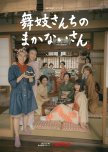Oversweet nostalgia, very tastefully executed
More in the style of a fly on the wall documentary, this sensitively scripted and filmed piece follows two nascent young women into the world of the Maiko. It has an art-house style that favours snippets of ordinary conversation to create the ambiance and atmosphere of their life rather than “telling” any type of story.
It’s a piece to immerse yourself in and it creates a glimpse into a secluded world where time has attempted to stand still. A world of women which is gentle, ordered, bounded, protected and essentially safe. But it has a cost and one of the characters says, “I can’t imagine how us girls could ever live outside of this city”. The restrictions imposed are like the inhibiting clothing and hairstyles, superficially attractive but stultifying, requiring a real-life sacrifice from the participants which is featured in the story. Overall though, the drama puts a glaze over their experience, effectively creating something sugary and homely, much in keeping with the nostalgia that inhabits their profession.
There are minor frictions but don’t look for antagonists creating problems to solve. The characters are universally pleasant and even the more troubled teenager is hardly abrasive. So there is no real depth here and it suffers in my opinion from being overly sweet.
The drama does not seek to contextualise the profession in terms of modern society and virtually all of the paying clients are shown as Japanese middle-aged men, representing a staid conservatism that reflects the stated desire to preserve the past as cultural heritage. There is none of the modern catering for tourists here, even though the photo opportunities when the Maiko are out on the streets is highlighted. Neither is there any discussion or concern shown for the future of such an expensive pastime that services a very small, select clientele.
Food is used as metaphor within the show and each episode features a separate dish. It was a deliberate design feature as one of the main characters becomes the cook and the series is named for that role. As I am fairly ignorant of Japanese cuisine and culture in general, there were abundant occasions where I felt that I was missing the references which were not explained. This would point to the drama being written for a domestic market rather than international consumption.
The cinematography uses as close to natural light as possible often creating the feeling of cloudy days and dim interiors and keeps the modern world of bright lights and kitchen conveniences at bay. The colour palette is very muted and this lifts the contrasting brightness of the maiko’s clothing, emphasising their uniqueness and separateness from the world around them.
Although I did not personally fall in love with this drama, the quality is undeniable, hence the rating.
What my rating means: 8+ A great drama with interesting content and good writing, direction, acting, OST, cinematography. But didn’t quite have the requisite sparkle to bump it into my all-time fave list. Worth watching.
It’s a piece to immerse yourself in and it creates a glimpse into a secluded world where time has attempted to stand still. A world of women which is gentle, ordered, bounded, protected and essentially safe. But it has a cost and one of the characters says, “I can’t imagine how us girls could ever live outside of this city”. The restrictions imposed are like the inhibiting clothing and hairstyles, superficially attractive but stultifying, requiring a real-life sacrifice from the participants which is featured in the story. Overall though, the drama puts a glaze over their experience, effectively creating something sugary and homely, much in keeping with the nostalgia that inhabits their profession.
There are minor frictions but don’t look for antagonists creating problems to solve. The characters are universally pleasant and even the more troubled teenager is hardly abrasive. So there is no real depth here and it suffers in my opinion from being overly sweet.
The drama does not seek to contextualise the profession in terms of modern society and virtually all of the paying clients are shown as Japanese middle-aged men, representing a staid conservatism that reflects the stated desire to preserve the past as cultural heritage. There is none of the modern catering for tourists here, even though the photo opportunities when the Maiko are out on the streets is highlighted. Neither is there any discussion or concern shown for the future of such an expensive pastime that services a very small, select clientele.
Food is used as metaphor within the show and each episode features a separate dish. It was a deliberate design feature as one of the main characters becomes the cook and the series is named for that role. As I am fairly ignorant of Japanese cuisine and culture in general, there were abundant occasions where I felt that I was missing the references which were not explained. This would point to the drama being written for a domestic market rather than international consumption.
The cinematography uses as close to natural light as possible often creating the feeling of cloudy days and dim interiors and keeps the modern world of bright lights and kitchen conveniences at bay. The colour palette is very muted and this lifts the contrasting brightness of the maiko’s clothing, emphasising their uniqueness and separateness from the world around them.
Although I did not personally fall in love with this drama, the quality is undeniable, hence the rating.
What my rating means: 8+ A great drama with interesting content and good writing, direction, acting, OST, cinematography. But didn’t quite have the requisite sparkle to bump it into my all-time fave list. Worth watching.
Vond je deze recentie nuttig?


 3
3 2
2
















